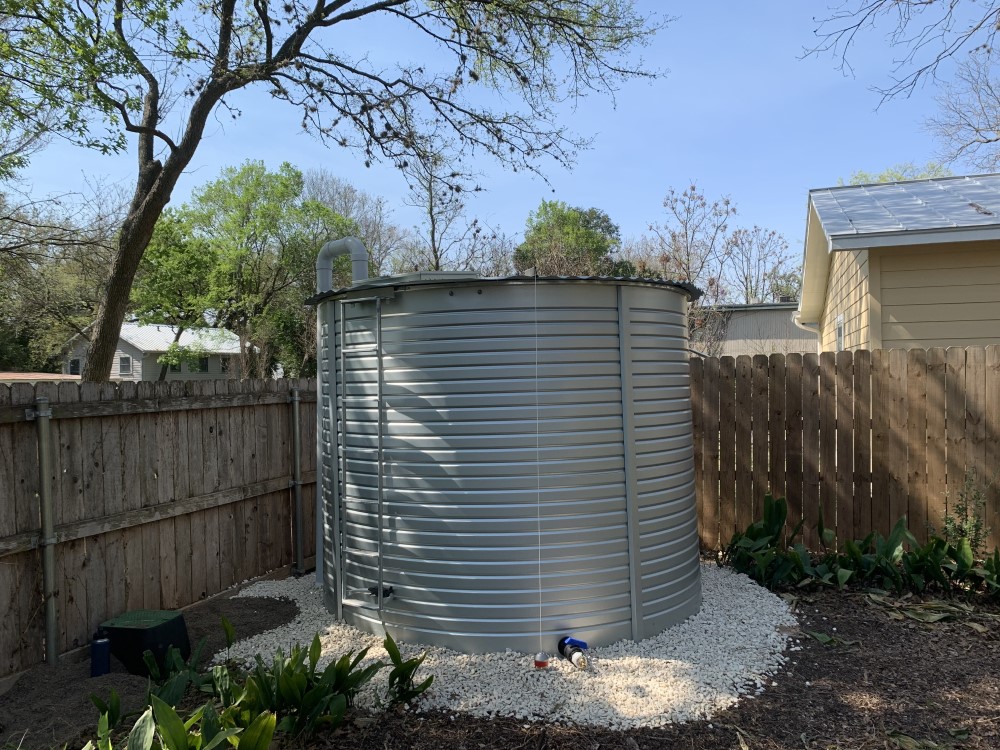Our Frequently Asked Questions
At FLOW Rainwater Systems, we offer turnkey rainwater collection systems throughout Central Texas and water storage tank installations nationwide. Contact us today to learn more!
Contact Us Today
One of the principles of rainwater management is to slow the water by collecting and using it onsite and slowly infiltrating any excess overflow. Collected rainwater can be an important source of high-quality water for crops, greenhouses, livestock, and humans even in very arid climates.
Rainwater harvesting has been used for thousands of years. The Old Testament mentions cisterns at least ten times, and rainwater harvesting systems in the Middle East date to 5,000 years ago. In the U.S., water shortages, quality concerns, and stormwater mitigation have renewed interest in this ancient practice.
The most enlightened rainwater harvesting practices involve recognition and exploitation of the relationships among the four components of ARCSA's mission: potable, non potable, stormwater, and energy. For example, sustainable harvesting of rainwater for gravity-fed nonpotable drip irrigation diminishes the stormwater impact of rain events, decreases the water-energy footprint, and displaces the need for an equal amount of highly treated potable utility water.
Rainwater can be used for any potable or non-potable use.
There are many reasons to harvest rainwater: quality of the resource; reduced appliance maintenance due to low mineral content; availability of a secure, onsite water source; and greater nutritional value for crops and gardens. Some successful rainwater harvesting businesses are growing because they make Return on Investment arguments to potential clients. Their rationale is based on the current and growing cost of utility water, the value of a rainwater harvesting system relative to other potential investments, the ability to mitigate costly stormwater effects, the quality of rainwater relative to utility water, the relative security of distributed water systems and — for a select few — the altruistic benefits.
Increasingly, consumers are attracted to rainwater for the quality of the resource. While surface and ground waters suffer from contact with the contaminants that are plentiful in those water sources, rainwater has fewer contaminants to deal with, and those can be reduced or eliminated by discarding the first portion of each rain event by using a "first divert" system, and by using the components and materials approved by the National Sanitation Foundation for rainwater collection. As a testament to the quality of rainwater, ARCSA endorsed six rainwater entries in the prestigious Berkeley Springs [West Virginia] International Water Tasting competition held in February 2011. Rainwater from Texas-based SparkleTap won First Prize in the Purified Water category, and Virginia-based RMS took fifth place. Click here for details.
Rainwater harvesters are the first conservation and efficiency advocates. It makes no sense to spend precious funds to augment water supplies if one has not first extracted the greatest benefit from water efficiency and conservation opportunities. In a related sustainability field, the same is true of exhausting energy efficiency and conservation opportunities before installing a photovoltaic system. If one was driving down the road and found that one’s parking brake was on, the first solution would be to release the parking brake, not to add more power by buying a bigger engine. Thus if one has not implemented water conservation and efficiency opportunities, it is premature to harvest rainwater.
A recent survey of the US rainwater harvesting market reveals substantial growth in the face of an otherwise stagnant economy. While it may appear that harvesting rainwater is simple, the best rainwater harvesters are multi-disciplined professionals. We strongly recommend that aspiring rainwater harvesters join ARCSA, avail themselves of one of ARCSA's periodic rainwater harvesting Accreditation workshops, and apply for Accredited Professional designation. The two-day program is designed to take someone aware of the fundamentals of rainwater harvesting to the next level through instruction in the proper design, installation, and maintenance of a rainwater harvesting system. ARCSA has also created a "graduate" level” certification — the Certified Professional — which is a designation available to an Accredited Professional who fulfills 48 hours of classroom or webinar instruction, attends a two-day Design and Construction workshop, and passes a rigorous examination.
The impact of climate change will vary greatly from region to region, but most studies agree that climate change will result in more intense storms, and these storms will result in more water runoff. Rainwater harvesting allows us to capture this runoff, put it to a useful purpose and slowly infiltrate overflow.
Turn-key Water Storage Solutions
If you are interested in placing a water storage tank on your property, give us a call, today!
Contact Us Today






